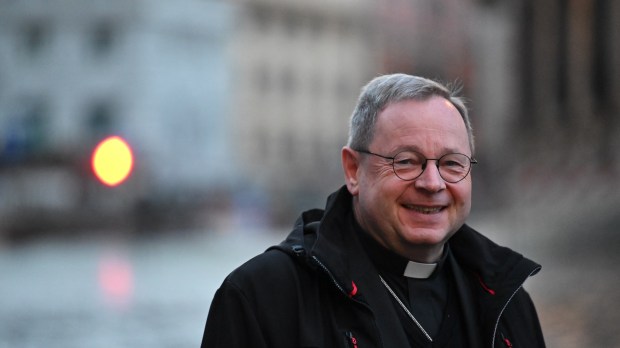Every day, Aleteia offers a selection of articles written by the international press about the Church and the major issues that concern Catholics around the world. The opinions and views expressed in these articles are not those of the editors.
Saturday 3 December 2022
~
1. German Catholics continue the Synodal Way despite the “slap” bishops received in Rome
2. Secularism is not a neutral choice: interview with Joseph Weiler, winner of the Ratzinger Prize
3. Mary McAleese accuses the Pope of “ludicrous lack of logic” on women’s ordination
4. Zelensky announces crackdown on Moscow-affiliated Orthodox Church in Ukraine
5. Ratzinger Prize winners visit Benedict XVI
~
1German Catholics continue the Synodal Way despite the “slap” bishops received in Rome
Two weeks after the ad limina visit of the German bishops, Die Tagespost published Catholics’ reactions to the concerns on the Synodal Way. Sister Anna Mirijam Kaschner particularly noted the “transparency” of the bishops’ visit to Rome, as all the speeches were made public. “Rome did not make a definitive decision, and that is a good thing,” she believes. “Rome has returned the synodal ball to Germany. It is now up to the bishops to keep this ball in the game of the universal Church,” continues the Sister, who expects that there will still be “disappointment and frustration, anger and tears – as after the vote on the basic text on church sexual morality, which did not reach the required two-thirds majority.” Bernhard Meuser, editor of YouCat, is pleased that the moratorium proposal was “barely averted by the horrified Bätzing faction.” However, he stresses that the “price” to pay is “good behavior.” “The synodal assembly in March is the last chance to reconnect with the universal church. With a few bishops this penny does not seem to have fallen yet,” he warns. Hanna-Barbara Gerl-Falkovitz, a philosopher of religion, is more concerned: “in intention the Way is to be welcomed, but in implementation it shoots far beyond the goal – if it does not even set itself the goal of establishing another Church. This “other church” would hurt in the flesh of the universal church, and it is already beginning to hurt.” She quotes Nietzsche on the Reformation: “Those who tried hardest to preserve Christianity have become its greatest destroyers – the Germans. It seems that the Germans do not understand the nature of the Church.” Journalist Paul Badde notes that the Pope “takes his time and instead had the Curia Cardinals Luis Ladaria and Marc Ouellet, on his behalf, thoroughly air out the theological laboratories in the Church in Germany once again.” However, the Argentine pontiff “will not let himself be pushed around forever […] he will not allow a new schism in Germany,” adds the journalist, mentioning “an unused joker in the Pope’s sleeve”: the replacement of the entire German bishops’ conference.
Die Tagespost, German
2Secularism is not a neutral choice: interview with Joseph Weiler, winner of the Ratzinger Prize
The American professor Joseph Weiler is the first Jew to be honored by the Vatican with the prestigious Ratzinger Prize for his remarkable contribution to the dialogue between reason and faith. The website Alfa y Omega interviewed the intellectual, who has worked his whole life on the process of European integration. The man who considers European cultural identity to be an inextricably linked fusion of Athens and Jerusalem in Western Christian culture finds it “demoralizing” that the members of the European Union refused to mention their Christian roots in the 2000s. However, he underlines the disappearance of Christianity as a living part of society, explaining that only 5% of French people now go to mass regularly. He considers that Christians are now a minority facing a “significant Christophobia.” He recalls that the founding fathers of the European community were all practicing Catholics who based their political action after the Second World War on “forgiveness and the conviction that redemption is accessible to all.” However, the mentality that animated them, that of a “culture of individual duties,” is lost today, mainly because the Church no longer has a voice in society, he explains. This, he analyzes, is also linked to the fact that Christians have come to embrace secularism as a form of neutrality. “When you are a Christian at home on Sunday and a citizen of the world in the public space, the ghetto has imposed itself,” he says.
Alfa y Omega, Spanish
3. Mary McAleese accuses the Pope of “ludicrous lack of logic” on women’s ordination
Former Irish president Mary McAleese accuses the pope of “misogynistic drivel” after his interview with America magazine, in which he discusses theological reasons for reserving ordination for men.
The Irish Times, English
4. Zelensky announces crackdown on Moscow-affiliated Orthodox Church in Ukraine
The Ukrainian president has announced a forthcoming crackdown on the operation of Moscow-affiliated Orthodox churches in Ukraine, after weeks of searches that reportedly uncovered stocks of Russian propaganda.
The Pillar, English
5. Ratzinger Prize winners visit Benedict XVI
After receiving the Ratzinger Prize in the Vatican’s Clementine Hall, the two winners, French priest Michel Fédou and American-Italian Jewish lawyer Joseph Halevi Horowitz Weiler, visited the Pope Emeritus.
Fondation Ratzinger, Italian

